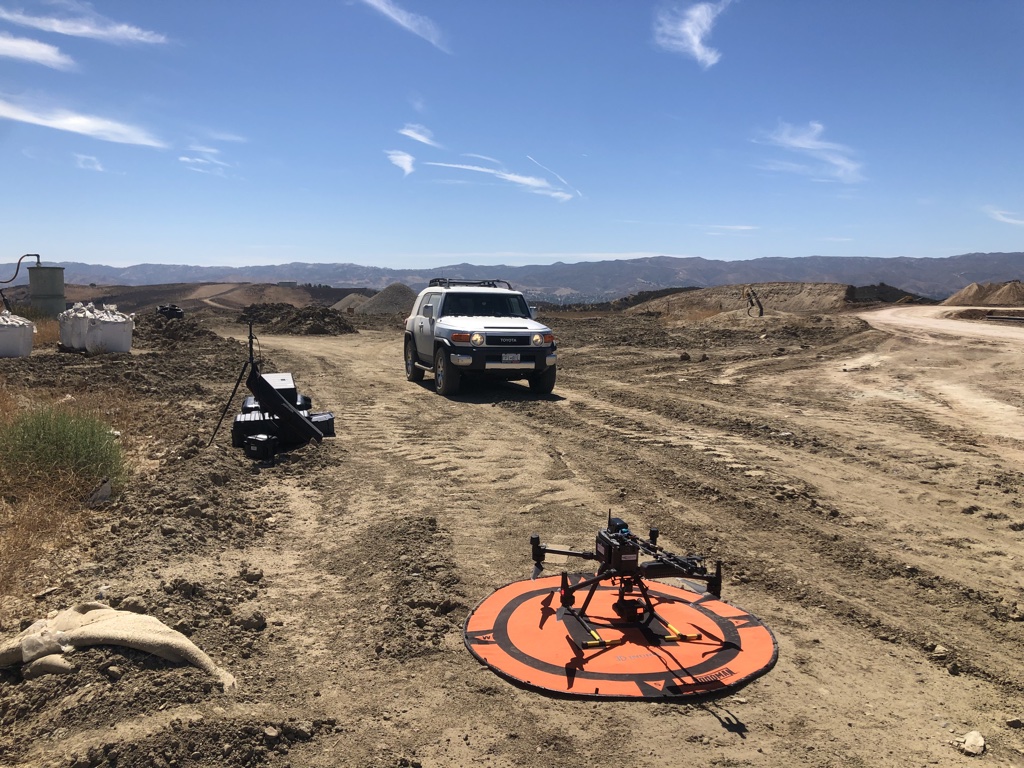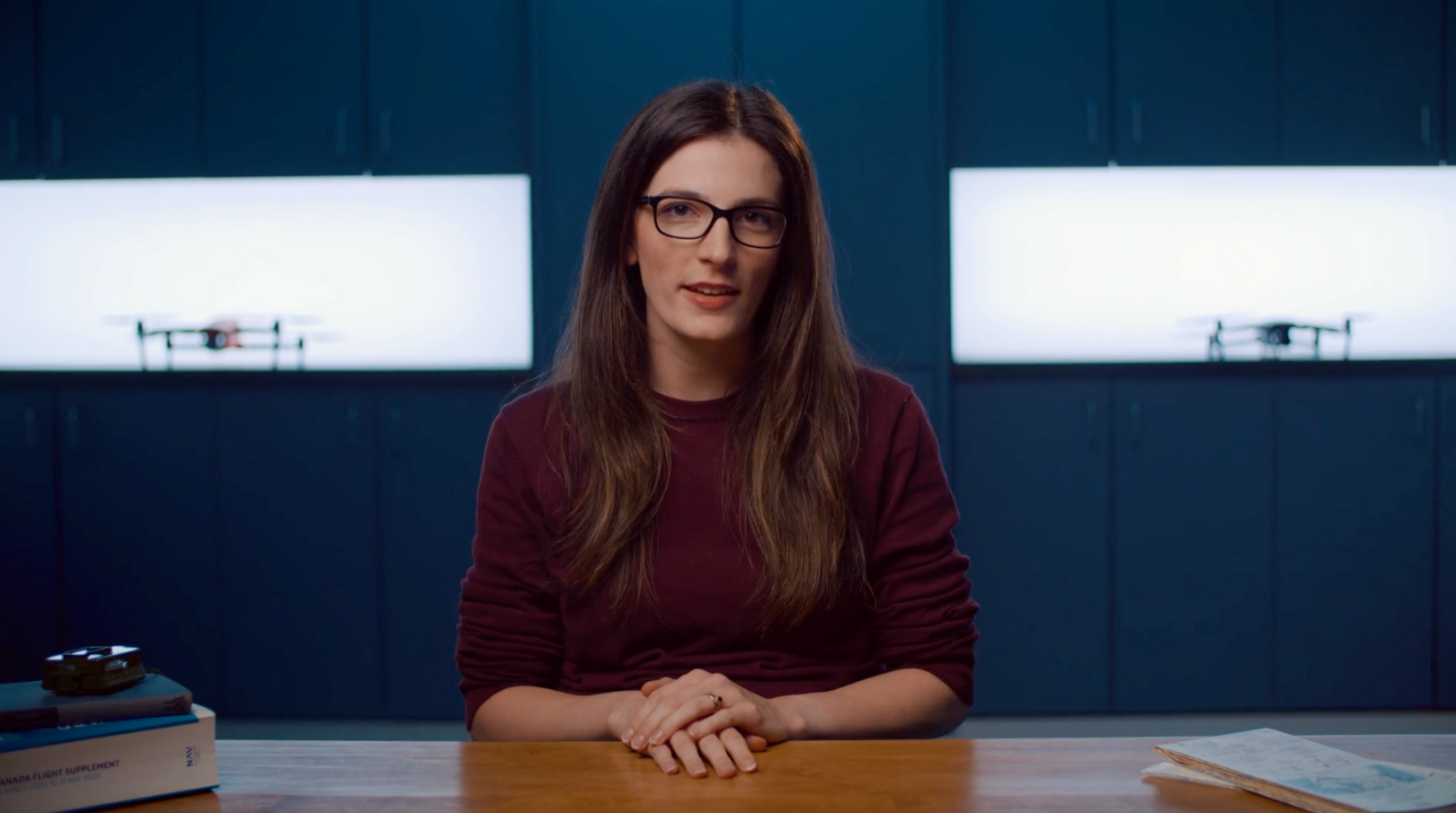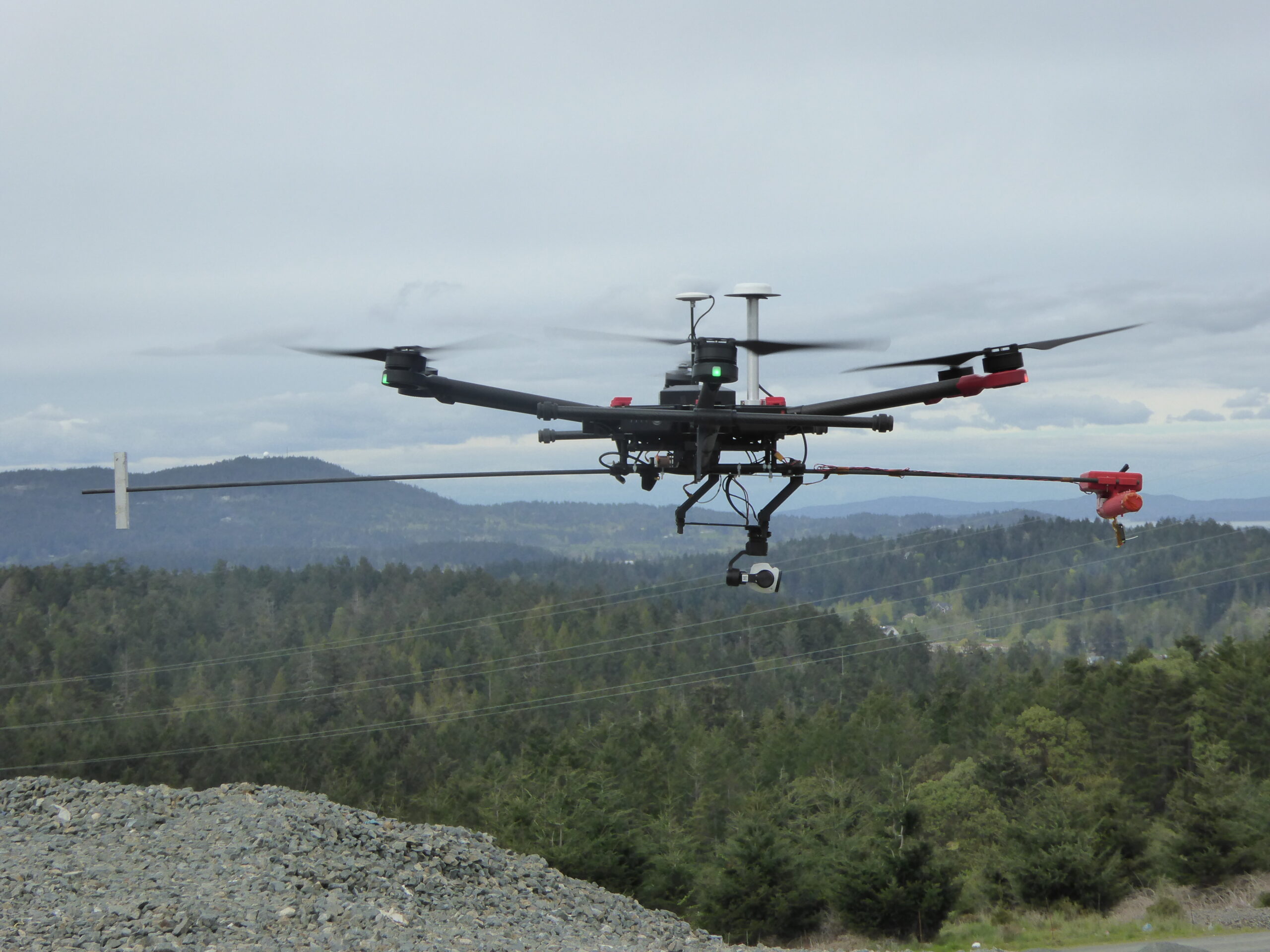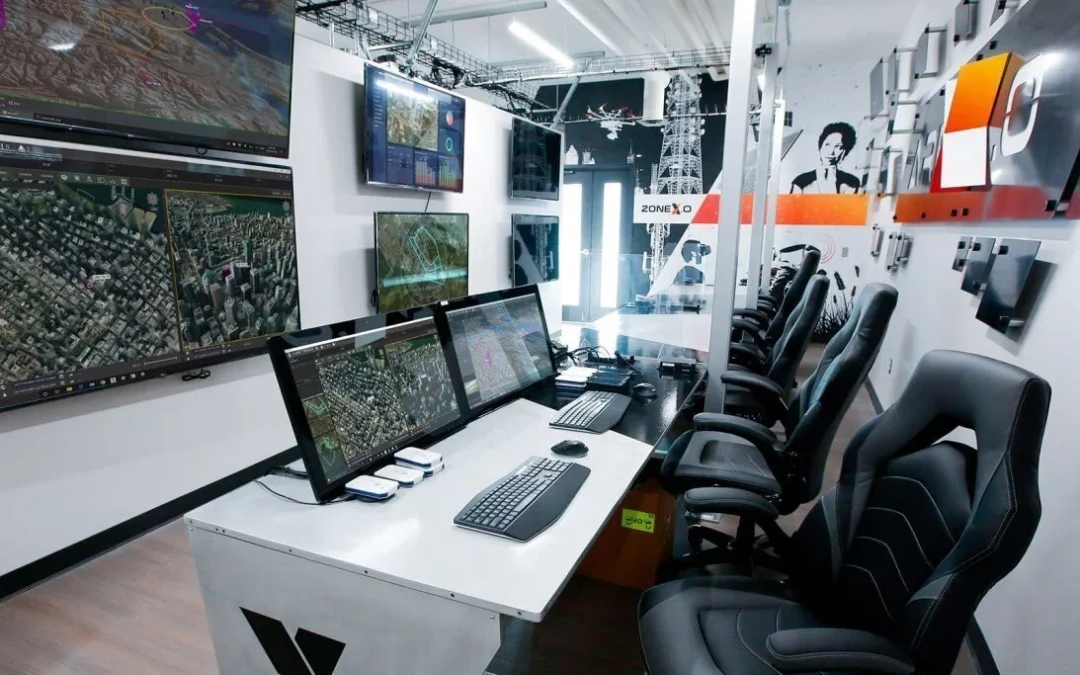


Hyperspectral Drones and Ground Robots for Crop Health Assessment and Yield Prediction
We have news. Or, more accurately, we *made* the news.
Pleased to see this coverage from Global on our partnership with the City of Kelowna. We’ll be monitoring apple, pear and cherry trees to assess crop health and anticipate fruit yields – using both hyperspectral drones and ground robots.
More details HERE
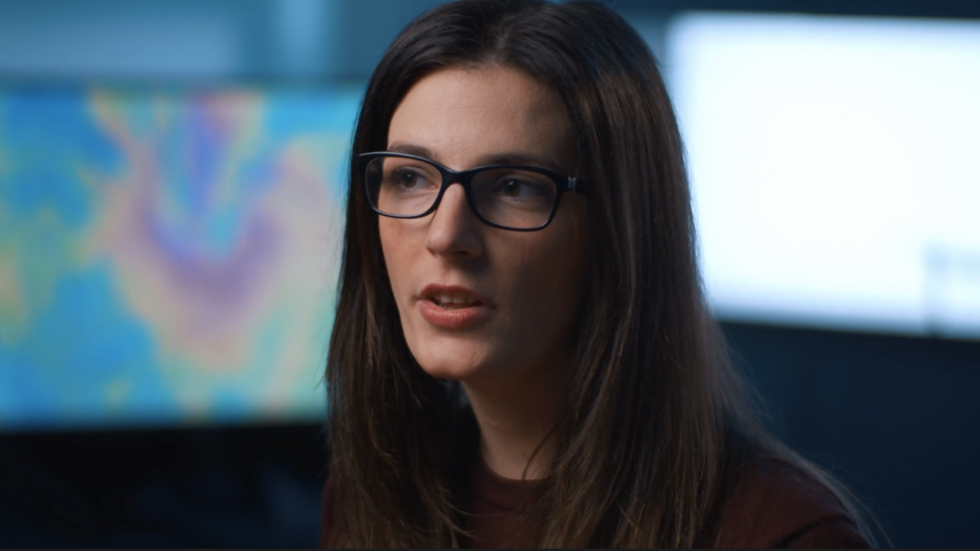
FLYY’s Kate Klassen on the importance of drone training
By Scott Simmie
Here’s a quick quiz for you: How many drones are registered with Transport Canada?
Take your best guess.
The answer? According to the latest Transport Canada RPAS Team Newsletter, the number is 86,131. That’s a lot of drones. Many of these – we’re confident the majority – are recreational/hobbyist machines. But the growing service provider sector is also a big contributor.
Quiz Number Two: How many Special Flight Operations Certificates were issued by Transport Canada in 2022? The answer here is 814, with the following breakdown:
- Beyond Visual Line of Sight Operations: 62
- Flying higher than 400 feet AGL: 48
- Flying in or near Department of National Defence airspace: 56
- Special Aviation or Advertised Events: 172
- RPAS weighing over 25 kilograms: 41
The math-inclined might notice those numbers don’t add up to 814. The final category – with 435 SFOCs issued in 2022 – is for Foreign Operators.
“It’s pretty obvious, but there’s been an incredible growth in the use of drones across all sectors,” says Kate Klassen, a licensed traditional aircraft pilot and flight instructor. She’s also InDro’s Strategy and Implementation Specialist.
“And based on what I’ve seen – including my work with the Canada Drone Advisory Committee (CanaDAC), these numbers will continue to grow for many years to come.”
Below: A professional drone operation
LICENSED PILOTS
Along with the growth in registered drones, there’s been a commensurate growth in the number of licensed RPAS pilots in Canada. Transport Canada has issued 86,709 Basic Pilot Certificates, and 10,060 Advanced Pilot Certificates. Advanced RPAS Certificates allow a pilot to fly in controlled airspace, closer than 30 metres to bystanders, and nearer than 3 NM (5.6 km) to airports and 1 NM (1.9 km) to heliports.
And of that number? Roughly one in eight received their training from InDro’s Kate Klassen.
Klassen was a pioneer in the training world, developing an online course that was both educational and entertaining. She did that prior to joining InDro, and some 10,000 people took her online course. That’s a phenomenal number.
And she’s at it again, with a series of online courses at FLYY.
We’ll get into FLYY – and the importance of training – in a moment. But first, let us more fully introduce you to Klassen.
She’s a commercial pilot and a flight instructor for both airplanes and RPAS. She’s been involved with aviation for the past 16 years and holds a Management of Technology MBA from Simon Fraser University. Klassen serves as a Director with the Aerial Evolution Society of Canada (formerly Unmanned Systems Canada/Systèmes Télécommandé Canada) and was a Director for BC/YK with COPA (Canadian Owners and Pilots Association). She was also Co-Chair of Canada’s Drone Advisory Committee (CanaDAC), working closely with Transport Canada. She’s an expert in regulations and training.
Plus, she’s an amazing educator.
Below: A screen grab of Klassen from one of the FLYY instructional videos
WHY BOTHER WITH A COURSE?
That’s a good question. Especially when there are options like YouTube, where you can find plenty of videos of people in their basements offering what they say are the knowledge requirements to obtain your Basic or Advanced RPAS Certificate.
We put that question to Kate.
“YouTube can be a great resource, but the challenge is knowing the accuracy and validity of the information,” she says.
“You want to trust the training provider, know their credentials and that they have the experience and expertise to be the one providing the training. In addition to video modules, FLYY also provides downloadable resources, interactive lessons and the ability to download for offline viewing.”
MORE THAN THE BASICS
What differentiates FLYY from some of the other online offerings?
For starters, Kate has deep expertise as both a commercial and RPAS pilot, as well as being an instructor. So you can have confidence you’re getting the Transport Canada knowledge requirements that ensure you’ve getting the fundamentals you need.
But FLYY offers more than just the tools to earn your Basic or Advanced RPAS Certificate. The website has a module (and templates) to help you create your own Standard Operating Procedures, including a comprehensive pre-flight checklist. Another popular offering is the Flight Review preparation package. That package, which includes typical questions an Advanced RPAS Certificate candidate would receive at their in-person Flight Review, is designed to help ensure you pass that final step your first time. (And, given that most in-person Flight Reviews cost $200-$300, you really do want to pass your first time around.
FLYY also offers Flight Reviews, regardless of your location in the country. Plus, once you’re registered with the site and taking a course, you’ll have access to an internal social hub where you can ask questions, post photos, and interact with other students and graduates of the FLYY program.
“I’m always happy to answer questions from students – and we get some good ones,” says Klassen. “This is something else you won’t get if you rely on a free online course. The courses have been carefully designed to ensure student success, and that’s also something I’m personally very much invested in. In fact, I like being a phone-a-friend lifeline for operators. It keeps me on my toes and problem solving at the pace of the industry.”
SPECIALIZED SKILLS
Drones have come a long way in the past decade. Like, a *really* long way. Think about it: DJI released its first Phantom in 2013 – a machine that required a separate GoPro in order to capture images. Now you can purchase a sub-250 gram drone with amazing range, connectivity and video/still qualities for less than $1,000.
But – particularly for those planning to become service providers or seeking professional employment – the knowledge base required has become more demanding. Gone are the days when having 50 hours of recreational drone flights might open the door to a job. Increasingly, employers are looking for people with highly specialised skills. They want candidates with experience flying thermal missions, capable of creating a LiDAR 3D digital twin – and much more.
Below: An Aerometrix methane-sniffing drone. Increasingly complex drones and drone operations require highly skilled pilots
MICRO-CREDENTIALS
The future of training, at least from Klassen’s perspective, will involve obtaining credentials for operations requiring specific skillsets. These would be short, focussed courses – online or in-person – that would provide pilots with the skills they’ll need to carry out more complex flights (and with more complex sensors). Upon successful completion, a pilot would receive a certification that will become recognized as the standard for that industry.
Geospatial Information Systems (GIS), photogrammetry, mapping, volumetric calculations, BVLOS flights are just a few examples where Klassen envisions Micro-Credential courses would be the most effective route to obtaining skills.
“These are definitely skills that are pre-requisites for many drone jobs and require specialized training,” says Klassen. “Upon successful completion, a pilot would receive a certification or badge that’s recognized by the industry.”
Klassen is currently planning Micro-Credential courses for FLYY.
“Micro-Credentials will one day be just as important in this field as obtaining your Advanced RPAS Certificate,” says Klassen. “And with the new facility that’s coming in Ottawa at Area X.O, we’ll have a location where training, testing and evaluation for highly complex operations can take place in a controlled environment.”
(FYI, we took a deeper dive into the case for Micro-Credentials here.)
ADVANCED TESTING
That new site, which we’ve written about here, is designed for both drones and ground robots. Drone pilots will face a demanding NIST (National Institute of Standards and Technology) course, built to the exacting specifications created by ASTM (the American Society for Testing and Materials). It will also feature a large enclosed, netted area where specialised drone training and testing can be carried out. Complex testing or failsafe evaluation – missions that might normally require a Special Flight Operations Certificate – can be safely carried out within that netted enclosure without the need for special permissions.
The facility, which will open in June, has been funded by Invest Ottawa as a strategic investment in Area X.O. The facility will be operated by InDro Robotics. It is the first of its kind in Canada.
“For the first time we’re seeing a ground and air robot (drone) training and testing space and I think we’ll see those technologies work more closely together in the future, too,” says Klassen. “As an educator, I’m excited for the course offerings we’ll be able to put together. So much thought has gone into the details and facilities in this space and I can’t wait to see how it’s received.”
Below: A look at the new facility during construction in late May.
INDRO’S TAKE
InDro Robotics was one of the first companies in Canada to offer specialized drone training – working with law enforcement and First Responders onsite and at Salt Spring Island. InDro takes training very seriously, which is why we partnered with Kate Klassen to create FLYY.
“We share Kate’s belief that demand for complex drone training and testing will only increase. We also agree that Micro-Credential courses and badges will be an important offering for those wishing to take their skills to the next level,” says InDro Robotics CEO Philip Reece.
“Between Kate’s excellent FLYY program and the forthcoming Area X.O facility, we’ll be creating and delivering cutting-edge training customized to meet growing industry demands.”
Want to get started with training now? Head on over to FLYY, then use the code “springisintheair” at checkout for 10 per cent off.

